80 years ago the Academy of Medical Sciences was founded
Increasing the duration and quality of life, a breakthrough in the treatment of many serious diseases. This is something that Russian medicine can be proud of today. June 30 marked the 80th anniversary of the founding of its flagship, the Russian Academy of Medical Sciences. On this solemn day, we turned to the most important milestones in its history, modern achievements, and asked leading academicians and corresponding members to recall the most dramatic and curious stories from their clinical practice.
 Retreat meeting of the RAS at the Center named after. Bakuleva
Retreat meeting of the RAS at the Center named after. Bakuleva
Despite the fact that in 2013 the Russian Academy of Medical Sciences became part of the large Russian Academy of Sciences, becoming its largest branch (its members make up 27 percent of all members of the Russian Academy of Sciences), medical academicians continue to celebrate its days birth.
He spoke about how it all began, about the glorious milestones in the history of the Medical Academy on the eve of the anniversary at a solemn off-site meeting of the RAS Bureau at the Institute of Coronary and Vascular Surgery named after. A.N. Bakuleva Academician-Secretary of the Department of Medical Sciences of the Russian Academy of Sciences Vladimir Starodubov.
“The concept of the Academy of Medical Sciences was born in the People's Commissariat of Health of the USSR. At its origins stood the People's Commissar of Health Georgy Andreevich Miterev, his deputy Vasily Vasilyevich Parin and Nikolai Nilovich Burdenko, the academician-secretary remembered the “founding fathers”. – Having studied the experience of foreign medical academies, they developed drafts of their Charter and future structure. The decree establishing the Academy of Medical Sciences was signed by Joseph Stalin on June 30, 1944. It included 25 industry institutes, representing all the main areas of medicine at that time.”
The first president of the USSR Academy of Medical Sciences was surgeon Nikolai Burdenko, who set the fight against epidemics, the development of the «problem of population movement», and the reduction of infant mortality as the top priorities for scientists.
During the war period, major studies were conducted in the field of physiology and pathology of higher nervous activity, surgery, and epidemiology. The country learned about the «stars» of that time: Pyotr Anokhin, Natalya Bekhtereva, Alexander Vishnevsky, Georgy Speransky and many others.
In the post-war period, space medicine developed. Its founder was academician Vasily Parin.
The third president of the USSR Academy of Medical Sciences, Alexander Bakulev, who combined the talent of a cardiovascular surgeon and organizer of science, emphasized the special role of studying theoretical issues in the field of physiology, biochemistry, and virology. In particular, under his leadership in 1956, a decision was made on joint planning of science “from above” — the Academy and “from below” — its parent institutes. Thanks to this approach, during his leadership, cardiologist Evgeny Chazov obtained theoretical and clinical data on the treatment of cardiovascular diseases with fibrinolytic (breaking down blood clots in blood vessels) enzymes.
Few people know — hello to Elon Musk — but it was in those early years, under the leadership of Natalya Bekhtereva, that for the first time in the clinic it was possible to introduce electrodes into brain tissue for a comprehensive study of its functions!
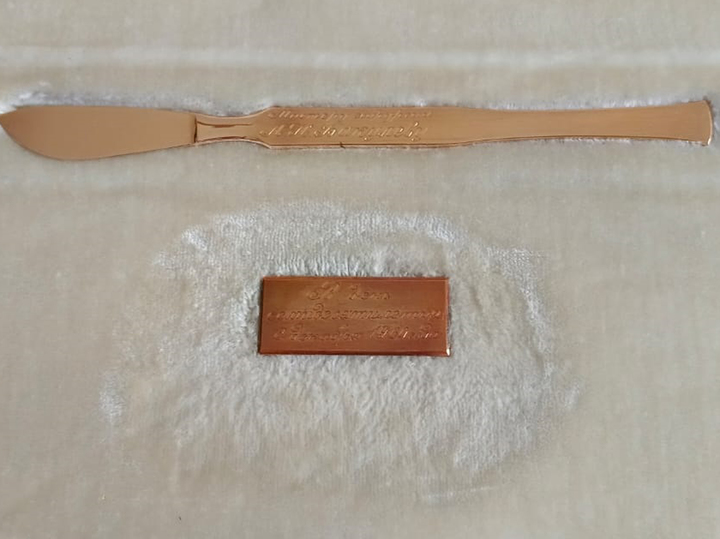 A golden scalpel presented to academician Alexander Bakulev on his 70th birthday in 1960. Recently, the scientist’s relatives donated it from their collection to the Museum of Cardiovascular Surgery of the Center named after. Bakuleva.
A golden scalpel presented to academician Alexander Bakulev on his 70th birthday in 1960. Recently, the scientist’s relatives donated it from their collection to the Museum of Cardiovascular Surgery of the Center named after. Bakuleva.
The end of the 20th — beginning of the 21st century was marked by strong work in the field of oncology, in which academician Nikolai Blokhin, the developer of quantitative methods for diagnosing malignant tumors, Nikolai Anichkov, who identified the patterns of the infectious process, shone.
In In the 80s, Leo Bockeria and Vitaly Bukharin introduced the method of hyperbaric oxygenation into heart surgery, which facilitates saturation of the body with oxygen.
For 80 years, much has been done by the doctors of our country for the first time in the world, and they still hold the palm in many areas. For example, in the Center for Transplantology and Artificial Organs named after. Shumakov, which is now headed by the 2024 State Prize laureate, academician Sergei Gauthier, performs more organ transplants per year than in all of Europe!
Domestic medical science is a leader in many areas. Thus, based on the results of 2023, the work of the Scientific Center for Research and Development of Immunobiological Preparations named after M.P. was recognized as the best in the Russian Academy of Sciences. Chumakov, where they developed and created industrial production of new vaccines against polio. Unlike the previous “live” vaccine, created in the 50s by virologist Mikhail Chumakov, the new one is inactivated. It is obtained by completely neutralizing bacteria and viruses while maintaining their immunogenic properties.
At the Neurosurgery Center named after. N.N. Burdenko has found a new approach to the treatment of brain glioma, which is based on accelerating the process of maturation of tumor cells with the loss of their ability to divide.
At the recent General Meeting of the Russian Academy of Sciences, the pioneering work of the Scientific Center of Neurology on creating a model of the “brain” was noted -chip.» This is nothing more than a digital twin of multiple intercellular ensembles of our brain, on which it is easier for scientists to develop methods for treating Parkinson’s and Alzheimer’s diseases and test the effectiveness of many medications.
There is no analogue in the world for the rehabilitation program for children with complex congenital heart defects, which was developed and successfully used by the specialists of the Center named after. Bakulev under the leadership of academician Elena Golukhova. As the academician told me, among the various stories of healing of their patients, there is the story of a young woman who, in childhood, was cured of a heart defect and already gave birth to three healthy children.
It is always more pleasant to talk about achievements than about mistakes and oddities, which, alas, occur in everyone’s work, and not only at the beginning of their career. And sometimes it is precisely such dramatically colored cases that are etched in the memory for a long time. Here are candid accounts from our leading scientists about such moments.
“A story that could have resulted in the death of a patient—I walked literally along the razor’s edge—happened to me when I was performing one of my first operations. I was 22 years old then. For us sixth-year students, especially those who had proven themselves well, the professors were already entrusting us with not too difficult cases. Appendicitis, confirmed by the mentor himself, was the diagnosis.
I operated on a patient with a nurse. When the appendix had already been removed and a stitch was applied, the professor came up: “Well, how? Everything is fine?» “Yes,” I say, I did everything, but my gloved hands began to stick to something.” He just looked, and everything immediately became clear to him: my gloves had become sticky due to the exudate that began to ooze from the peritoneum. It turned out that the appendicitis was reactive, which did not begin on its own, but against the background of peritonitis, which arose due to the intestines being punctured… by a fish bone. Can you imagine what would have happened if I hadn’t paid attention to the sticky gloves?! So they would have stitched up the patient… After all, this bone in the intestines came as a surprise to everyone. But the experienced surgeon managed to prevent the terrible consequences in time.
15 years of gratitude
Academician-Secretary of the Department of Medical Sciences of the Russian Academy of Sciences Vladimir Starodubov:
– I will remember for the rest of my life an incident from my early surgical practice (my first education was in surgery). I was then 28 years old, I was on duty in the emergency room of one of the hospitals in Sverdlovsk. A patient comes to us with intestinal obstruction and urgently needs laparatomy (cutting the body in the abdominal area — author). I identify a tumor in the ascending colon and decide to have surgery to remove it. According to the rules, during such an operation it was necessary to first remove the colostomy (to empty the bowels) in order to reduce the likelihood of subsequent suture divergence. Without this, it was not recommended to remove part of the intestine. But I was young, hot-tempered, and I felt sorry for the woman, who was then just over 40, and didn’t want her to have to go around with a colostomy later. I decided: if there are no metastases, I will immediately remove the tumor and perform an anastomosis — I will form a bypass for the food masses by stitching together two parts of the intestine.
In the morning, the professor, the head physician, gave me a hard time for my initiative: “How dare you go for a radical operation without a colostomy?! — he shouted. “What if she develops a complication?!”
I ran to this patient almost every hour after the operation to check her condition. Fortunately, her recovery went well, otherwise my medical career probably would not have happened. And this woman (she was deaf and dumb) came to the department for 15 (!) years later and congratulated me on all the holidays. All the nurses from the waiting room had time to tell me was: “Vladimir Ivanovich, your deaf-mute has come to see you here!” I went out, she “said” something with gestures, gave some hand-made gifts, I understood something, she wrote something to me on a piece of paper — that’s how we communicated until I moved to Moscow.< /p>
– I’ll tell you about the most serious clinical case from my practice. I was at Shumakov’s anniversary (Valery Shumakov — transplantologist — author) and Andrei Seltsovsky, the then head of the Moscow Department of Health, called me: “David Georgievich! In the 15th hospital there is a very serious patient. Already 40 fibrillations were performed due to cardiac arrest! I beg you, go and sort it out. I arrive and tell my colleagues that we urgently need to take him to the operating room to restore blood supply. And they: “Our device is damaged.” I know that the survival rate in such cases is zero. I tell his wife: “He will die here — 100 percent, if we transport him to our center, the probability is slightly higher that he will survive.” And she, in fact, saved him by agreeing to the transportation, during which he had several more cardiac arrests. In the operating room, it turned out that one important vessel supplying blood to the heart was closed. I open it, put in a stent, and — as if it happened by hand — the heart “went on and on”, no stopping. Afterwards, this patient always called me his second father when he met.
Of curiosities. During my duty at the hospital, a patient was brought in at one in the morning, also with multiple cardiac arrests. He and I suffered until three o'clock, we finished at the beginning of 4, and I go to the office to take a nap. In the morning I walk along the corridor and hear a terrible scream and scandal in the intensive care unit. I ask the staff, who is shouting? “This is the half-dead patient you saved last night!” On the one hand, I’m pleased that he’s already noticeably better, but what made him angry? It turned out that in the morning they had not yet had time to make food orders for him and they brought porridge from another patient who refused it, they did a favor, it turns out. But, you see, he didn’t like that the porridge was a little cold…
Another incident similar to a joke. I was leaving the hospital, and right in front of me a man collapsed — cardiac arrest. They took him to the hospital and operated on him. Two days later I had already forgotten about him, when suddenly the nurse informed me that a patient was asking me very persistently. I, believing that he, as often happened, would now thank me, wanted to avoid the meeting, but he was very persistent… “Okay, let him come in,” I say. “Hello,” says the patient, do you remember me? — «Of course I remember!». “You know, when this happened to me, I had a cap and it disappeared somewhere, maybe you know where it went?”
– One story from my practice was reminiscent of a real detective story, where doctors acted as researchers.
In the early 2000s, a patient who was in menopause came to a medical facility complaining of sharp pain in her side. She was diagnosed with a stomach ulcer and successfully treated. But soon other alarming symptoms began to appear: a sharp weight loss of more than 10 kilograms and a loss of 15 centimeters in height in just four years! And one day, out of nowhere, a burning thirst came up.
Suspicions of diabetes were not confirmed, however, osteoporosis was diagnosed, a disease that makes bones brittle. The patient even suffered a femoral neck fracture, which often happens with such a diagnosis.
It is now known that in the presence of osteoporosis, doctors should first think about disruption of the parathyroid glands (paired organs that are located near the thyroid gland and regulate the exchange of calcium and phosphorus in the body — author). 20 years ago, our Center was just beginning to popularize knowledge about the pathologies of this organ in the country. Therefore, in the primary care of this patient, these glands escaped the attention of diagnosticians.
The secret of the patient’s poor health was revealed only after an ultrasound scan of the thyroid gland — a tumor was discovered in one of the parathyroid glands. The patient was sent for treatment to the Endocrinology Center.
After the surgeons successfully removed the affected organ, a long recovery began. But there were still many surprises. Since the pathological changes had already affected the kidneys, gastric mucosa and heart vessels, even with the removal of the tumor, the associated problems did not immediately disappear. Our patient survived a heart attack, but since there was no longer a root cause, the function of the heart muscle was quickly restored.
If, even at the very first signs, our patient had undergone all the necessary tests and ultrasound, and an increased calcium level had been detected in time in the blood, as well as a neoplasm of the parathyroid gland — it would be possible to begin treatment in a timely manner and avoid the entire complex of complications experienced and being experienced, that is, to “catch the situation” in the initial period.


















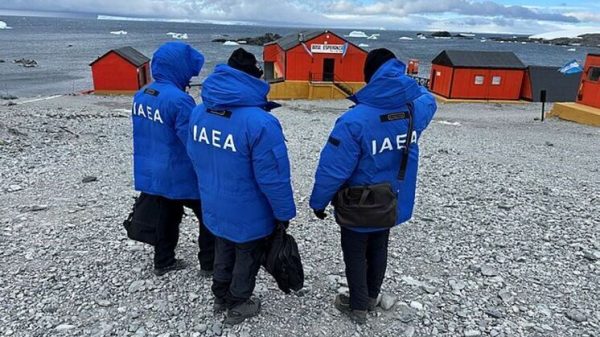
















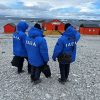



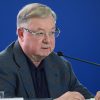
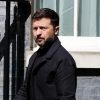













Свежие комментарии